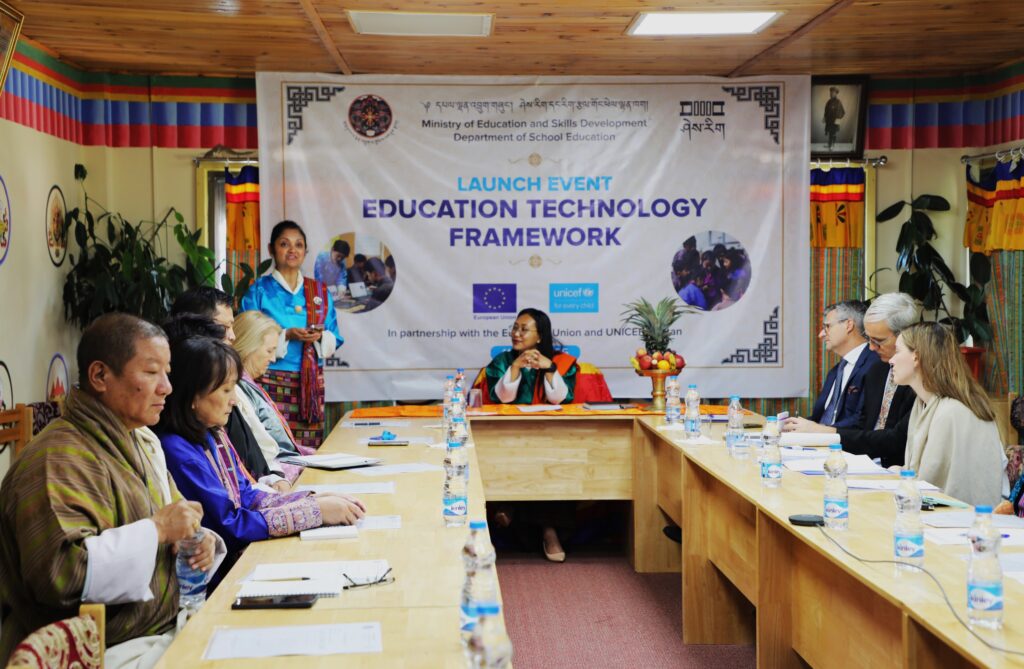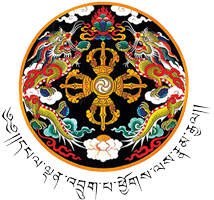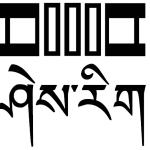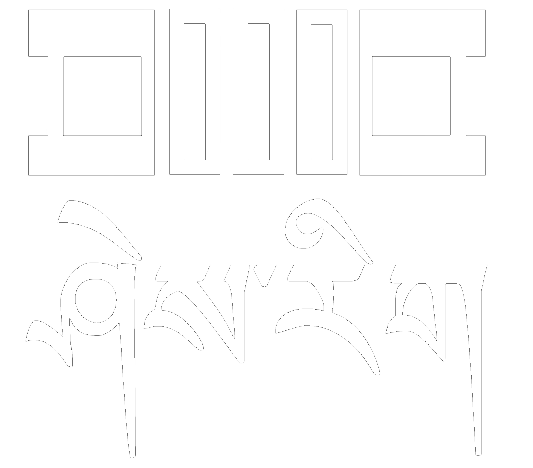𝘗𝘢𝘳𝘵 𝘰𝘧 𝘵𝘩𝘦 𝘌𝘶𝘳𝘰𝘱𝘦𝘢𝘯 𝘜𝘯𝘪𝘰𝘯 𝘧𝘶𝘯𝘥𝘦𝘥 𝘥𝘪𝘨𝘪𝘵𝘢𝘭𝘪𝘴𝘢𝘵𝘪𝘰𝘯 𝘪𝘯 𝘦𝘥𝘶𝘤𝘢𝘵𝘪𝘰𝘯 𝘪𝘯𝘪𝘵𝘪𝘢𝘵𝘪𝘷𝘦, 𝘵𝘩𝘦 𝘧𝘳𝘢𝘮𝘦𝘸𝘰𝘳𝘬 𝘸𝘪𝘭𝘭 𝘦𝘮𝘱𝘰𝘸𝘦𝘳 𝘴𝘵𝘶𝘥𝘦𝘯𝘵𝘴 𝘢𝘯𝘥 𝘵𝘦𝘢𝘤𝘩𝘦𝘳𝘴 𝘢𝘤𝘳𝘰𝘴𝘴 𝘉𝘩𝘶𝘵𝘢𝘯
#Thimphu: Achieving a significant milestone in the Digitalisation in Education initiative, the Ministry of Education and Skills Development (MoESD), the European Union (EU) and UNICEF launched Bhutan’s Education Technology Framework (ETF) today. Funded by the EU with €1 million, the initiative is implemented by the MoESD in partnership with UNICEF Bhutan. It aims to enhance children’s learning experiences and skills development by providing reliable school connectivity, digital content and capacity-building programs while promoting cybersecurity awareness.
The Framework is set to transform teaching and learning across the country by setting the standards and guiding an equitable and efficient integration of technology in children’s learning from early childhood to secondary education.
The ETF responds directly to His Majesty’s Royal Decree of 2020, which emphasised the urgent need to modernise Bhutan’s education system to prepare its youth for a rapidly evolving global landscape. It also aligns seamlessly with the goals set out in Bhutan’s 13th Five-Year Plan, particularly in strengthening digital infrastructure, enhancing digital literacy and fostering innovation in education.
“The launch of the ETF marks a new era for education in Bhutan,” said the Minister of Education and Skills Development, Yeezang De Thapa. “This framework is our commitment to fostering a ‘Nationally-rooted, inclusive and equitable digital education that empowers all learners with the knowledge, skills and values required to thrive in 21st century Bhutan and beyond. It is a strategic document to ensure that every child in Bhutan has the opportunity to excel in a technology-driven world, irrespective of their background or location.”
The ETF comprise of eight inter-related policy and standards documents, designed for leaders, policymakers, administrators, and teachers and students.
“This EU funded initiative supporting access to technology in and for education will empower 6,000 students and 400 teachers in 10 selected pilot schools. It will facilitate teaching and learning. It will help students develop technology and digital skills,” said the EU Ambassador to Bhutan, Hervé Delphin. “This funding will support Bhutan’s resolute efforts to modernise its educational system for the benefit of the current and future generations of Bhutanese youth. The EU-Bhutan partnership will continue to put the development of the human capital at its core.”
While acknowledging current infrastructure challenges and the digital divide, particularly between urban and rural areas, the Education Technology Framework provides practical and actionable guidance that is both ambitious and realistic. It aims to move Bhutan from its current “Emerging” and “Applying” stages of ICT in education towards an “Infusing” stage, where technology is seamlessly integrated across the curriculum and learning.
“The Education Technology Framework is not just a policy document. It is a commitment to our students, to our teachers and to our future,” said UNICEF Bhutan Representative, Rushnan Murtaza. “It is a blueprint for action, designed to ensure that every learner regardless of where they live or what resources their school currently has can access the digital skills they need to thrive in the 21st century.”
The framework focuses on critical areas of enhancing digital literacy skills for teachers, ECCD facilitators and students, developing relevant digital content, promoting personalised and competency-based learning and ensuring cybersecurity and online safety measures.
With the launch of the ETF, work will now begin to put these standards and guidelines into action. The MoESD will initiate the development of a comprehensive training package based on ETF’s digital literacy standards for teachers, followed by capacity building programmes to equip educators with the skills to effectively use technology in teaching and learning.
All activities related to digital transformation of education will be aligned to the ETF at both national and Dzongkhag level. This alignment will ensure the widespread and effective adoption of EdTech in Bhutan’s education system, thereby enhancing both pedagogical practices and student learning outcomes.














